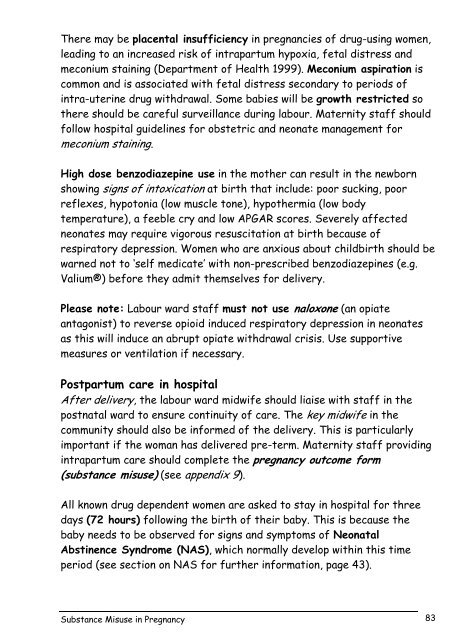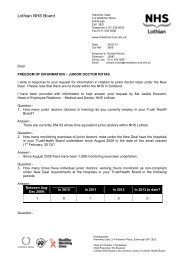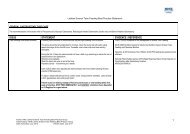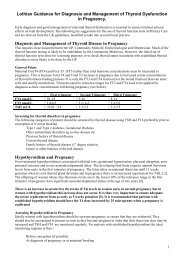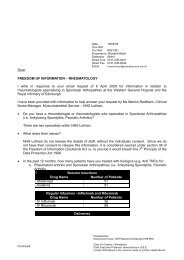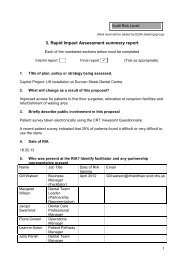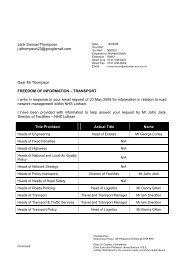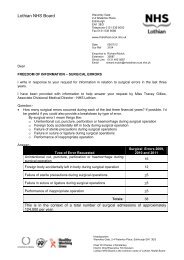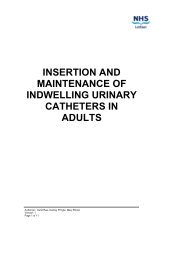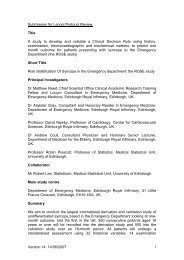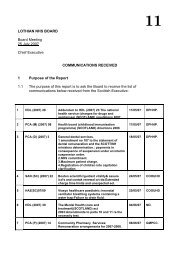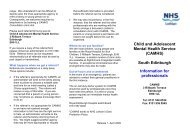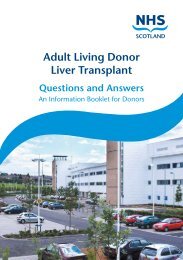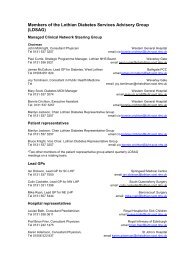Substance Misuse in Pregnancy - NHS Lothian
Substance Misuse in Pregnancy - NHS Lothian
Substance Misuse in Pregnancy - NHS Lothian
You also want an ePaper? Increase the reach of your titles
YUMPU automatically turns print PDFs into web optimized ePapers that Google loves.
There may be placental <strong>in</strong>sufficiency <strong>in</strong> pregnancies of drug-us<strong>in</strong>g women,<br />
lead<strong>in</strong>g to an <strong>in</strong>creased risk of <strong>in</strong>trapartum hypoxia, fetal distress and<br />
meconium sta<strong>in</strong><strong>in</strong>g (Department of Health 1999). Meconium aspiration is<br />
common and is associated with fetal distress secondary to periods of<br />
<strong>in</strong>tra-uter<strong>in</strong>e drug withdrawal. Some babies will be growth restricted so<br />
there should be careful surveillance dur<strong>in</strong>g labour. Maternity staff should<br />
follow hospital guidel<strong>in</strong>es for obstetric and neonate management for<br />
meconium sta<strong>in</strong><strong>in</strong>g.<br />
High dose benzodiazep<strong>in</strong>e use <strong>in</strong> the mother can result <strong>in</strong> the newborn<br />
show<strong>in</strong>g signs of <strong>in</strong>toxication at birth that <strong>in</strong>clude: poor suck<strong>in</strong>g, poor<br />
reflexes, hypotonia (low muscle tone), hypothermia (low body<br />
temperature), a feeble cry and low APGAR scores. Severely affected<br />
neonates may require vigorous resuscitation at birth because of<br />
respiratory depression. Women who are anxious about childbirth should be<br />
warned not to ‘self medicate’ with non-prescribed benzodiazep<strong>in</strong>es (e.g.<br />
Valium®) before they admit themselves for delivery.<br />
Please note: Labour ward staff must not use naloxone (an opiate<br />
antagonist) to reverse opioid <strong>in</strong>duced respiratory depression <strong>in</strong> neonates<br />
as this will <strong>in</strong>duce an abrupt opiate withdrawal crisis. Use supportive<br />
measures or ventilation if necessary.<br />
Postpartum care <strong>in</strong> hospital<br />
After delivery, the labour ward midwife should liaise with staff <strong>in</strong> the<br />
postnatal ward to ensure cont<strong>in</strong>uity of care. The key midwife <strong>in</strong> the<br />
community should also be <strong>in</strong>formed of the delivery. This is particularly<br />
important if the woman has delivered pre-term. Maternity staff provid<strong>in</strong>g<br />
<strong>in</strong>trapartum care should complete the pregnancy outcome form<br />
(substance misuse) (see appendix 9).<br />
All known drug dependent women are asked to stay <strong>in</strong> hospital for three<br />
days (72 hours) follow<strong>in</strong>g the birth of their baby. This is because the<br />
baby needs to be observed for signs and symptoms of Neonatal<br />
Abst<strong>in</strong>ence Syndrome (NAS), which normally develop with<strong>in</strong> this time<br />
period (see section on NAS for further <strong>in</strong>formation, page 43).<br />
<strong>Substance</strong> <strong>Misuse</strong> <strong>in</strong> <strong>Pregnancy</strong><br />
83


